Trudy J. Morgan-Cole's Blog, page 33
October 24, 2021
The Invisible Life of Addie LaRue, by V.E. Schwab

This is a high-concept novel where the concept really works and I almost could not put the book down. Remeniscent for me of books like Kate Atkinson’s Life After Life (which is briefly name-checked in a bookstores scene in this book, a nice nod) and others where a character lives multiple lives or comes back over and over or lives well beyond a normal lifespan, this is about a young 18th century French girl who makes a deal with (sort of) the devil for eternal life. She doesn’t know exacly what she’s getting — Addie just wants freedom and an escape from the narrow life she was born into. What she gets is eternal youth, health, beauty, and invulnerability to any kind of injury and harm — all of which is great, but of course, there’s a catch.
The catch is that no-one who sees, meets, or speaks to Addie can remember her once she’s out of their range of sight. So she can get help from others, have wonderful conversations, even have great one-night stands (though I was troubled by the implication that none of them men she spent the night with over a course of several hundred years ever had to get up to go to the bathroom and then was horrified to find a strange woman in their bed — the complication of people having to leave the room to pee is not addressed in the book). But none of her relationships can ever be permanent, nor can she even have stable work or housing, since nobody would ever remember having hired her or rented to her. She has what she wanted — a life of complete freedom – as she is never able to establish any permanent ties whatsoever.
Then one day, she meets a man who is different. A man who remembers her.
That’s all you need to know about the setup to this book, and if it sounds like you’d enjoy it, you probably would. I devoured it.
October 22, 2021
The Secret Keeper of Jaipur, by Alka Joshi
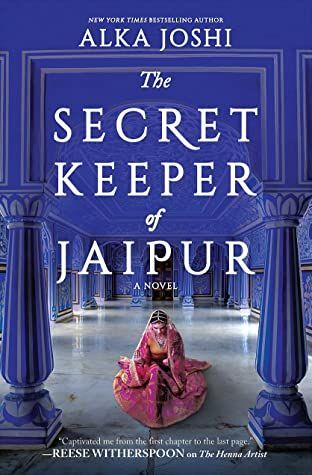
The Secret Keeper of Jaipur is a sequel to The Henna Artist, which I read recently and also liked. This novel takes up the story some twelve years after the end of The Henna Artist, when some of the secrets kept in that novel are in danger of coming to life. The main character of that book, Lakshmi, is still present in this one, but the focus of the story shifts to Malik, the orphan boy who once worked as her servant and errand-boy. Now a young man of twenty, Malik leaves Lakshmi’s new home in Shimla to return to Jaipur and seek his fortune among old friends and enemies in the city.
This novel has the same engaging characters and vivid setting that made the first novel so good. I hope there is a third in the series, as we’ve yet to get a story focused on Lakshmi’s sister Radha, and that would round out a trilogy very nicely.
A Place of Execution, by Val McDermid
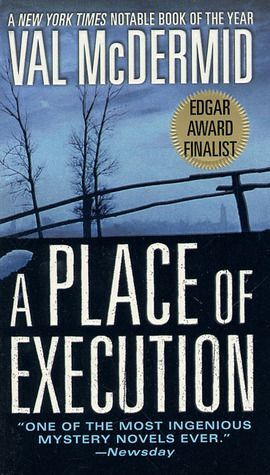
A Place of Execution is a book I picked up because an online book club I’m in was reading it, and it really grabbed me almost from the first pages. It’s the story of a young police officer investigating the disappearance of a 13-year-old girl from an incredibly remote and isolated English village in 1963. The bulk of the story unfolds as a straightforward mystery, with the police trying to get the taciturn villagers to open up enough to solve the mystery of what befell the young girl. But the reader knows from the beginning that there will be a twist at the end — the framing device of the novel is that in the 1990s, a journalist is writing a book about this case. The now-retired police officer who cracked the case has been co-operating with her and giving interviews, but then, just as the book is about to go to press, he writes her a letter begging her to withhold publication — new information about the old case has come to light that he cannot reveal, but that changes everything.
With this letter at the beginning of the book, even as we read through what appears to be a mystery novel, we know that the satisfying conclusion is not what it seems to be: the police detective appears to solve the crime, but we know that there must be a missing piece that will come to light more than 30 years in the future.
Knowing this, I read the 1963 story looking for missed clues, trying to figure out what the foreshadowed twist would be. When I did get to the reveal, though, it genuinely took me by surprise. Though the subject matter is grim, the puzzle-solving aspect of this mystery made it a joy from start to finish.
October 18, 2021
Between Two Kingdoms, by Suleika Jaouad
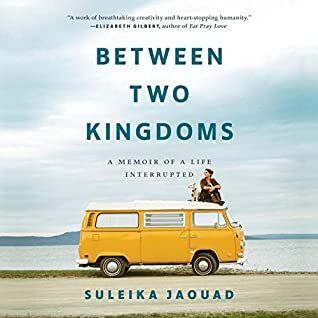
Between Two Kingdoms tells two stories. The first is Suleika Jaouad’s story of getting sick with a particularly nasty form of cancer when she was in her early 20s — so early, in fact, that she had not launched on a career or a relationship or really figured out anything about her life at all, before she was hit with the possibility of that life ending.
She didn’t die, but the life she expected to life in her 20s was taken from her almost as effectively as if she had died. The years she expected to spend travelling, establishing a career, having fun with friends, falling in love, were replaced by lengthy hospital stays, brutal rounds of treatment, a bone marrow transplant, cycles of remission and relapse, bonds formed with fellow young cancer patients who, one by one, died.
Throughout these years, in addition to the support of her parents (and her brother, who provided the bone marrow transplant), Jaouad had one unwavering constant: her boyfriend Will. (That’s the name she gives him in the book; ten seconds of googling will tell you his real name, because Jaouad wrote and was interviewed about her cancer experience a lot while it was happening). She and Will had a whirlwind romance and had barely even cemented their status as a couple when she got her diagnosis, so his role as caregiver and hers as patient were baked into their pairing from the beginning. Throughout this first part of the story, people are amazed at how devoted, how loving, how dedicated Will is to Suleika throughout all her suffering.
Anyone who knows a little about human beings should not be surprised at the twist in the story where the relationship falls apart just as Suleika is finally starting to get a bit better: these are two young people in their 20s who have been together for several years, but have never been together as a healthy pair of equals, only as a caregiver and a sick person. Suleika’s recovery, her breakup with Will, and her discovery that living as a person without cancer is not as simple as flicking a switch back to the person she used to be, all set the stage for the second part of the book, in which this young woman who has never learned to drive and barely ever lived indepedently sets off on a cross-country odyssey with a van, a dog, and a list of strangers she’s corresponded with but never met.
I found this book to be a thoughtful and insightful exploration of what it’s like to be a young cancer patient and how hard it is to move on from that trauma.
The House of the Wolf, by Alison Baird
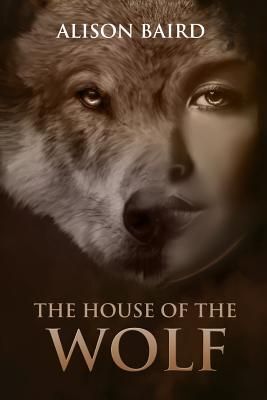
The House of the Wolf is pretty clearly going to be about werewolves; the cover art would tell you that even if the back cover blurb didn’t tip you off. But it’s a werewolf novel so solidly rooted in the real lives of both humans and wolves that it almost doesn’t feel like the fantasy novel it is.
The novel introduces us to two characters: a young wolf, outcast from his pack, who finds himself strangely drawn to humans, and a young woman, Chantal Boisvert, who is also outcast from her “pack” in a way. An orphan, she has never fit in well with her mother’s family in Vermont, and knows nothing of her Quebecois father’s family. A trip to Quebec to reconnect with her roots uncovers far more than Chantal had imagined.
The werewolf lore here is well-thought-out and developed in a way that draws on the traditions of the French-Canadians loups-garous and Metis rougarou, as well as on the behavior of actual wolves in the wild. It’s inevitable that the two main characters, woman and wolf, will eventually meet up in a form that allows them to get to know each other, but the path taken to get there is full of surprising twists and turns. And who knew Quebecois society was absolutely rife with werewolves? (And yet, it makes a kind of sense…)
September 6, 2021
Uprooted and Spinning Silver, by Naomi Novik
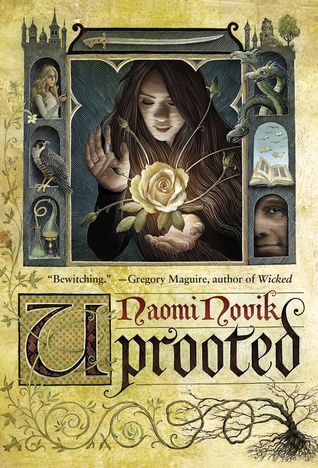
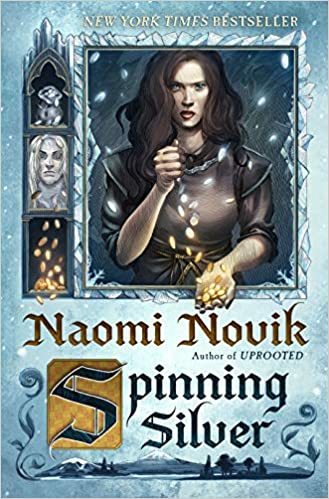
I put these two books together even though, despite the similar cover design as you see above, one is not a sequel to the other nor are they even specifically set in the same universe. Rather, I’d say they have the same flavour — fantasies very loosely based on fairy tales, deeply rooted in Eastern European culture and folktales (and, in the case of Spinning Silver, specifically Eastern European Jewish culture).
Uprooted is a Beauty-and-the-Beast style tale of Agnieska, a young village girl who is chosen by “the Dragon” — not an actual dragon, but a wizard who lives in a tower and, once every ten years, chooses a young girl to come live with him and serve him. Agnieska and everyone else in town has always assumed her beautiful friend Kasia will be the one chosen for those unwelcome honour, but instead it’s Agnieska who gets plucked out of her life and put in the tower, only to learn that she has unsuspected magical powers of her own.
Spinning Silver is the story of three young women — a Jewish moneylender’s daughter named Miryem, a poor peasant girl named Wanda, and a noblewoman named Irina — whose fates come together to defeat both a powerful ice-spirit that’s holding their land captive to winter, and a vicious fire-demon that has possessed the most powerful person in the land. I liked both these books a lot, but Spinning Silver was my favourite of the two — I loved the way the three characters’ stories wove together, and I loved the emphasis on the importance of kinship and community as the powerful bonds that people need in order to fight evil. Each of these three women is powerful and yet believable in her own way, and each has a key role to play in defeating evil forces and saving their community. While the Rumplestiltskin legend about spinning straw into gold is the inspiration that sparks this story, this is a much bigger and more interesting story than that one fairy tale, and I found it an intriguing read from start to finish.
The only book by Naomi Novik I’d read before was the first book in the Temeraire series, which my husband loved and still counts among his favourite fantasy series, but which didn’t really grab me or draw me in. However, I found these absoutely fascinating and loved Novik’s writing in both Uprooted and Spinning Silver.
August 27, 2021
The Long Way to a Small Angry Planet, by Becky Chambers
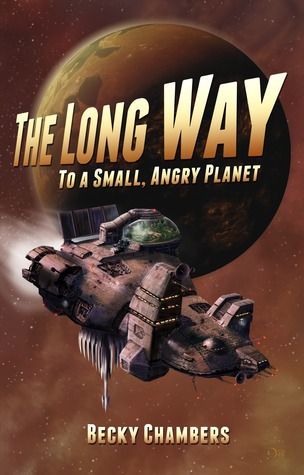
See my previous review about Becky Chambers’ novels — after I read and loved A Psalm for the Wild-Built, I had to go back and read her earlier Wayfarers series, beginning with the first volume, The Long Way to a Small, Angry Planet. It’s set in a different future world from the world of A Psalm for the Wild-Built, but it has a similar sensibility — a belief that while human society can’t go on as it’s currently going, what comes afterwards, while different, might be better.
In this version of Chambers’ future, humanity is one among many species out exploring the galaxy, under the watchful eye of a Galactic Confederacy. If that sounds a bit Star Trekky to you, it’s worth noting that this is no human-dominated United Federation of Planets; in these novels, humanity is a recent addition to the spacefaring races, and is looked on by the others as possibly a bit too primitive and dangerous to be trusted (actually this was also canonically true originally in the Star Trek universe, but it’s somewhat obscured by the fact that the Federation is so human-centric in the time period of the TV series and movies).
The titualar Wayfarer of this series is a small spacecraft with a tight-knit crew of various species. Where Chambers really shines here is in creating different species that don’t just feel like “humans with one or two different physical/cultural features,” as is the case in a lot of sci-fi, but alien species that actually feel like fully thought-out and fleshed-out different kinds of beings, where different physiology leads to cultural differences that make sense. As a result, the book’s reflections on what it means to be human — or rather, to be a sentient being — take on an additional richess and variety. I really enjoyed this book and look forward to reading the others set in the same universe.
August 26, 2021
A Psalm for the Wild-Built, by Becky Chambers
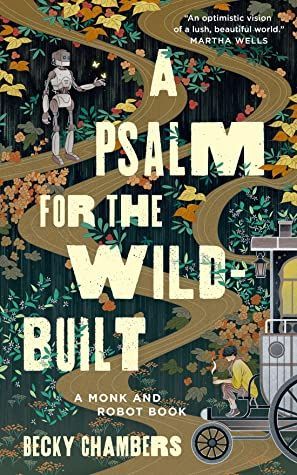
Becky Chambers is a sci-fi author I’ve just discovered after hearing some buzz about her online, and I really love her books and I think I’m going to end up reading everything she’s written and waiting eagerly for her next book.
I’m iffy on sci-fi. I like my Star Treks,, all of them (and I used to read a lot of Star Trek novels back in the day, though I haven’t for a long time), but there aren’t a ton of actual sci-fi novels that I’ve really loved — I can’t think of many, other than Hank Green’s books and Andy Weir’s The Martian that have been true favourites. I especially can’t be at it with dystopian fiction — it just hits me too hard and depresses me too much.
A Psalm for the Wild-Built is futuristic. It’s set either on Earth or on a very Earth-like, human-inhabited planet with a history similar to Earth’s, after the collapse of the planet’s highly technological society. So you’d think it was going to be dystopian fiction, but it’s not. It’s about a human society that has rebuilt itself after collapse, in a way that’s not like the pre-collapse world, but is functional and interesting and enjoyable. It’s not dystopian but neither is it utopian — can a book just be topian? Or perhaps it is utopian, because A Psalm for the Wild-Built posits a world in which humanity has learned from its mistakes and tried to “build back better” — which, in 2021, honestly does seem like a pretty idealistic concept.
One of the key things we know about the past of this novel’s world is that the human society of the past relied very heavily on robots to do their work — and one day, just as so much of our science fiction predicts, the robots became sentient. But instead of robots rising up to destroy their human masters, or humans brutally enslaving the robots, humans and robots just — agreed to go their separate ways. They live in separate territories and have had no contact with each other for hundreds of years.
In this post-apocalyptc human world we meet Dex, a twenty-something, non-binary monk in a religious order dedicated to worshiping the six gods humanity seems to have settled on. Dex likes being a monk, but they’re also restless, leaving the comfort of the monastery to head out on the road serving people in a travelling tea ministry (part tea-house, part counselling service) — yet even that leaves Dex wanting more. Which leaves Dex curious about the wilderness beyond human civilization, and in a perfect position to be the first human in centuries to encounter a robot.
Not only is this world brilliantly and beautifully drawn, but Dex and Mosscap, the robot he meets, are delightful, interesting characters. I’m so glad this book appears to be the first of a series so that I will have more to look forward to. This was an absolutely pleasure to read.
August 12, 2021
The Henna Artist, by Alka Joshi

I’m always a sucker for a novel set in India. This one is set in 1950s Jaipur. where Lakshmi, who ran away from her abusive husband as a teenager, has reinvented herself as a woman of many talents — the henna artist of the title, but also a purveyor of herbal remedies, including those which will induce an abortion for women pregnant out of wedlock. Both Lakshmi’s public and under-the-table trades earn her a good living from the wealthy women of Jaipur, and she is close to achieving her greatest dream — a house of her own, where she can finally live independently.
Because Lakshmi has lost touch with family back home in her village — they are disgraced by her leaving her husband and want no further contact, even when she writes home — she doesn’t know that her parents are dead, nor that she has a 13-year-old sister, born after Lakshmi’s disappearance. When the orphaned sister, Radha, tracks Lakshmi down in Jaipur, Lakshmi’s hard-won success and independence suddenly becomes a lot more complicated.
I loved all the rich details of time and place in this story, as well as the characters who were vivid and intriguing. A sequel is already out and I’ll definitely be reading that as well!
The Missing Treasures of Amy Ashton, by Eleanor Ray

This was a light-feeling book about an actually very heavy subject. Amy Ashton, a woman in her early 30s who has a good job in London and apparently a fairly sensible life, is secretly a hoarder. Like, the really bad kind of hoarder where she can barely get around her own house for all the junk she has stashed in it. I actually found it stressful to read the descriptions of Amy’s house, but the author makes Amy’s descent into hoarding (which we see through flashbacks) believable in the context of her character and the past trauma she’s experienced. We also see how new relationships and discoveries about the past help to coax her a few steps along the path towards healing — but along the way she discovers that the loss she is grieving from a decade ago is both less painful, and far more painful, than she had imagined it was. I found this a quick page-turner that I didn’t want to put down.



